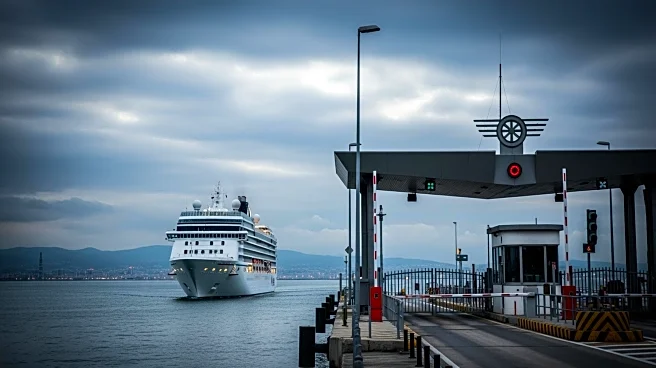What's Happening?
China has introduced new 'special port fees' targeting cruise ships, which could significantly impact the cruise industry, particularly U.S.-owned or operated ships. The fees, which began on October 14, are a reciprocal measure in response to U.S. port fees targeting Chinese
ships. The fees apply to U.S.-flagged and built ships, as well as those operated by U.S. companies. The Riviera, a cruise ship operated by Oceania Cruises, was scheduled for a port call in Shanghai but diverted to Busan, South Korea, due to the $1.6 million fee. Meanwhile, Royal Caribbean's Spectrum of the Seas returned to Shanghai after receiving a waiver for the fees, although this exemption is not guaranteed for all ships. The fees are substantial, with current charges at $56 per net ton, expected to rise to $157 per net ton by 2028. This development has led to speculation that cruise lines may reconsider their port calls in Shanghai, with Disney Cruise Line reportedly unlikely to proceed with planned calls.
Why It's Important?
The imposition of special port fees by China could have significant repercussions for the cruise industry, particularly for U.S.-based companies like Carnival Corporation, Royal Caribbean Group, and Norwegian Cruise Line Holdings. These fees could lead to increased operational costs, potentially causing cruise lines to cancel planned port calls in Shanghai, affecting their business strategies and market presence in Asia. The move also reflects ongoing trade tensions between the U.S. and China, with reciprocal measures impacting industries beyond traditional commercial shipping. Cruise lines may need to reassess their itineraries and market strategies in response to these financial pressures, potentially affecting tourism and economic activities linked to cruise operations in the region.
What's Next?
Cruise lines are likely to evaluate the financial implications of the new port fees and may adjust their itineraries to avoid costly port calls in Shanghai. This could lead to a reduction in cruise operations in China, impacting local tourism and related industries. Stakeholders, including cruise companies and tourism boards, may engage in discussions to seek exemptions or negotiate terms to mitigate the impact of these fees. Additionally, the broader trade relationship between the U.S. and China may influence future policy decisions affecting the cruise industry.
Beyond the Headlines
The introduction of special port fees by China highlights the complexities of international trade relations and their impact on diverse industries. It underscores the strategic use of economic measures in geopolitical contexts, where countries leverage industry-specific policies to respond to broader trade disputes. This development may prompt cruise lines to explore alternative markets or strengthen partnerships with non-U.S. entities to maintain their presence in Asia. The situation also raises questions about the long-term sustainability of cruise operations in regions affected by such economic policies.















